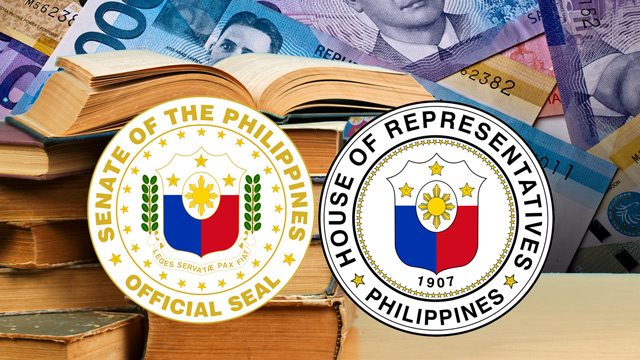SUMMARY
This is AI generated summarization, which may have errors. For context, always refer to the full article.

MANILA, Philippines – Both Houses of Congress recently ratified the bicameral conference committee report on a bill that seeks to provide free tuition and other school fees in state universities and colleges (SUCs), local universities and colleges (LUCs), and government-run technical-vocational institutions.
The House of Representatives ratified the final version of the Universal Access to Quality Tertiary Education Act on Monday, May 29, while the the Senate ratified it on Tuesday, May 30.
During a press conference on Wednesday, May 31, Senator Paolo Benigno Aquino IV said lawmakers predict that the bill will be signed into law by President Rodrigo Duterte by June or July.
If so, students can already enjoy the benefits of the law by the second semester of school year 2017-2018.
Aquino also discussed some of the highlights of the bicam version of the bill:
- It will cover both tuition and other school fees of undergraduate Filipino students enrolled in SUCs, LUCs, and tech-voc institutions run by the Technical Education and Skills Development Authority (Tesda).
- Students in both public and private higher education institutions (HEIs) have access to scholarship grants and student loans. Those who want to pursue a post-graduate course can avail themselves of student loans.
Figures from the Commission on Higher Education (CHED) show that, as of school year 2016-2017, there are 231 public HEIs in the country: 112 SUCs, 105 LUCs, and 14 “other government HEIs.”
A total of 1.62 millions enrolled in public HEIs that school year.
Senator Sherwin Gatchalian said that, under the bill, once a student passes a public HEI’s entrance exam, he or she will no longer have to pay tuition and other school fees.
“We will allow the universities to come up with a mechanism to maintain a certain requirement, standard so that you’re still entitled to free tuition. What we want to avoid are students who keep repeating subjects and overstaying in schools, so we have to make sure that the student is serious and the student maintains the standards,” he said in a mix of English and Filipino.
Aquino, the principal sponsor and co-author of the bill in the Senate, also reiterated that, if necessary, students can avail themselves of all the benefits stated in the bill.
“If I’m studying in an SUC, my tuition is free, other school fees are free, but I need help with my transportation and meal allowance, I can apply for a TES or the Tertiary Education Subsidy,” he explained.
“For example, I’m already finished with my undergraduate program, I’m going to take up law, or medicine, or a masteral course, I can also apply for a student loan program. The payment of the student loan will be tied up with GSIS and SSS payments, so that we’re sure it’s collected,” Aquino added.
Major reform
Lawmakers agreed during the bicameral conference committee that if the law takes effect during the second semester, the 2018 budget will be used to fund its implementation. Another option in funding the law is through a supplemental budget.
Gatchalian said more or less P50 billion to P53 billion will be needed every year to fund the law.
“The projected increase by next year is more or less about P400 billion. Our budget will already reach about P3.6 trillion to P3.7 trillion. So the source of the fund is the P400-billion increase, we will get more or less P20 billion from that because as we speak, we already found about P30 billion to fund the law,” the senator explained.
Funds for SUCs and LUCs will be coursed through CHED, while funds for tech-voc institutions will be coursed through Tesda.
“Maybe I can safely say this is the most major reform the legislature has come up with so far, and if this is signed by the President hopefully by June, this will be the biggest reform of this administration legislatively,” Aquino noted.
CHED, together with the Department of Budget and Management, already issued implementing guidelines on the grant of free tuition in SUCs nationwide after it was given an additional P8-billion allocation under the 2017 budget.
But unlike the pending bill in Congress, CHED’s tuition-free policy for school year 2017-2018 will not cover all students in SUCs and will instead prioritize beneficiaries of government student financial assistance programs. – Rappler.com
Add a comment
How does this make you feel?
There are no comments yet. Add your comment to start the conversation.